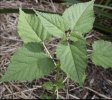Tanuki
New Member
Hello! Does anybody know if mulberry weed, also known as crabweed, Latin name is Fatoua Villosa ( this plant is different from mulberry tree ) is safe to feed to a Hermann’s tortoise? We have a ton of this weed all over the place in the state of Georgia. I can’t find it on the tortoise table.
